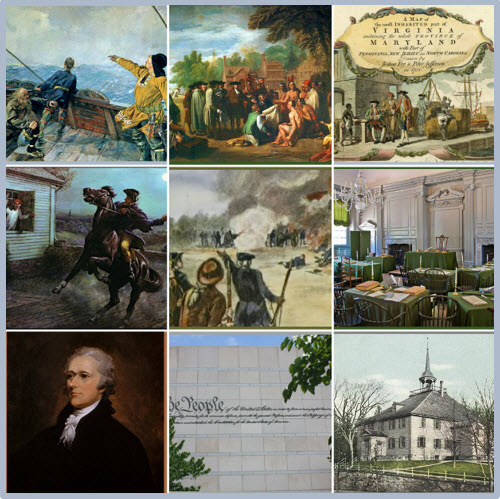 FIRST SEMESTER
FINAL EXAMINATION
FIRST SEMESTER
FINAL EXAMINATION

A
Quick Review
Our
course began with the arrival of European explorers in what became known as the
Americas. They were driven by the ideals
of the Renaissance, the race for faster trade routes, new technology, economic
gain, a desire to spread Christianity and competition for global
influence. Although this led to the
displacement of Native Americans, Spain, France, the Netherlands and England
claimed land and established settlements in North America.
English
settlements grew into well-populated, permanent colonies that varied because of
geography and the ideas of their founders.
The colonists considered themselves British citizens and believed that
they were entitled to the same rights as their countrymen on the opposite side
of the Atlantic. The British government,
however, thought that the colonies existed for the benefit of the home
country’s economy.
The
long-standing rivalry between England and France spread to North America where
the colonists and the British army fought the French along with their Indian
allies. Although the French and Indian
War resulted in a British victory, it left England with a large debt. To the British government, it seemed
reasonable to tax the colonists to pay for the war. The colonists, who had no representation in
Parliament, considered this proposal not only unreasonable but unfair. They objected and boycotted British goods. When the British government responded with
harsher measures, the protest intensified, and the American colonists formally
announced their separation from Britain with the Declaration of Independence.
Clashes
between armed colonial minutemen and British troops developed into the American
Revolutionary War. In spite of great
odds, the American army was victorious, but maintaining a central government
was in some ways an even greater challenge.
When the guidelines provided by the Articles of Confederation proved
inadequate, the delegates of the Constitutional Convention developed a new plan
for governing the republic.
The
United States Constitution, based on the principles of federalism, separation
of powers, checks/balances and popular sovereignty, continues to be the foundation
of American government. Through its
implied powers, it has adapted to changes created by the passage of time,
advancements in technology and global events.
For example, even though it is not specifically mentioned in the
Constitution, the federal government established the First Bank of the United
States and the Federal Reserve to keep the U.S. economy stable.
 Go to Questions 1 through 50 to complete the
First Semester Final Examination.
Go to Questions 1 through 50 to complete the
First Semester Final Examination.